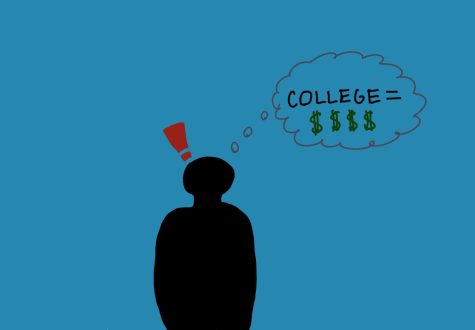Elite exemption
Paying for college as an independent student
March 31, 2022

In my nightmares, my tuition bill plays the leading role. It haunts my dreams while also invading my subconscious thoughts during the day. The stress of having enough money to pay for school is constant and debilitating.
While many students at Seattle Pacific University face money struggles, they may not feel the full brunt of their tuition bills in the same way that I do. Many of my friends at SPU receive some sort of financial help from their families. I do not.
From the moment I graduated high school and made the decision to travel from Longmont, Colorado to Seattle, I knew I would have no support from my family.
It is not that my family does not support my decision to attend college. My family is very proud of me. They constantly remind me with repeated joy-filled remarks every time I pick up the phone to call them. When I say that I do not have support from my family, I mean that I pay for every cent of my schooling alone.
I started my freshman year of college at SPU as an independent student, which means that neither of my parent’s financial information was taken into account on my Free Application for Student Aid. The only income that was considered was my own, and it has been that way for the past two years.
To get a financial override on FAFSA and to qualify as an independent student, you have to go through a lengthy and aggravating process to prove that your particular situation is without a doubt an “extraordinary circumstance.” The process of filing for an exemption at SPU included filling out a dependency override appeal, writing a personal statement and gathering two additional statements from people who could verify my ‘hardships.’
I found the process to be very invasive. It triggered many bad memories that I did not want to articulate onto paper. Despite my discomfort, I had to do it if I wanted a chance at a college education. There were no other options.
Fortunately, my family situation was unfortunate enough to fit the standards. I also had close family friends who could attest to my struggles. I was lucky to have these people who knew the insurmountable emotional trauma I had faced at the hands of both my mother and father by the time I was 18.
If they had not known that my father was a recurring criminal offender and that my mother had experienced a drug relapse in my junior year of high school, I would have never gotten financial aid. These people were the reason I was able to go to college and begin a new life.
Although I barely have enough money to pay the outrageous sums of money that I owe SPU, I do know that I would not be in Seattle if it were not for that override.
Unfortunately, not every student who pays for college on their own is fortunate enough to get this exemption that will allow them to apply for aid independently. The ones who do are a part of an elite group of ‘less fortunate’ kids, which is not how it should be. What are students supposed to do if their parents refuse to pay for their college education or their parents’ income gets them little to no financial aid?
The answer according to the official Federal Student Aid website is to wait until you are 24 years old and can no longer be claimed as a dependent. The other alternative is to obsessively wish on a star and pray that you will get every single scholarship you apply for.
If a student does not fit into the slim window of extenuating and extreme circumstances, they are not worthy of receiving financial aid from FAFSA. If they are not within their guidelines and still cannot use their parents’ financial information, these students are simply out of luck. This is completely demoralizing and crushes the dreams of many aspiring college students.
The lack of financial support and ridiculous qualifications for aid are crucial factors as to why many young adults in less than perfect environments are doomed to stay stuck there forever. They could make it out. These potential students could rise beyond their misfortunes if only someone gave them the chance.
Why should any student or individual be robbed of an education, or at least a chance at education, just because their life isn’t the exact level of ‘unfortunate’?
My answer to that is simple. I do not think any student should be robbed of the opportunity to go to college, especially not because their life was not depressing enough to qualify them for aid.
I made it out of Colorado and have been able to achieve things I never thought possible, but that could end any day. It has been rough this year. I am overdue on many tuition bills right now, but at least I was able to get some aid from SPU. Many others do not get anything and my heart shatters for them.
What about everyone else who needs this override but cannot get it? Why are they not allowed to follow their dreams? And why are they forgotten about or lost in the mix?
No one should be forgotten or excluded from the chance to earn financial aid on their own. It is not like they get more money from filing independently; the money is the same. The only difference is that students have the chance to choose their path.
A family’s financial status and life circumstances should not get the final say in a student’s decision. They should have the final say. Attending college and pursuing lifelong dreams should be the student’s choice, not the choice of anyone else. More effort needs to be put into helping every student pay for college, not just a select few.



























































































